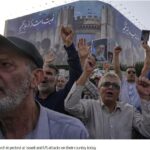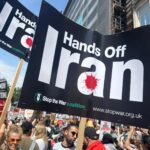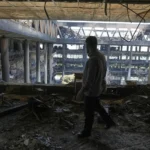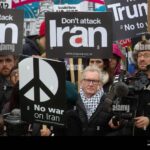
A recent report by prominent labour union the Coordinating Council of Iranian Teachers’ Trade Associations (CCITTA) has drawn attention to the continuing disturbing, indeed escalating, trend of teachers and education workers being targeted for persecution by the authorities in Iran merely on account of their engaging in legitimate trade union activity to defend their wages and working conditions.
The report details systematic dismissals, disciplinaries, and prosecutions of these educator activists as well as the recent forcing into exile of Mr. Esmail Abdi, a longtime prominent figure in the union’s movement – laying bare the extreme measures continually employed by the ruling regime to suppress any form of dissent, particularly if it is organised activity, inside the country.
The CCITTA, a hugely important coordinating body encompassing approximately 20 provincial chapters of the Iranian Teachers’ Trade Association (ITTA), has played a crucial role in organising peaceful protests and advocating for fundamental teachers’ and educators’ fundamental rights for many years now. This has included the articulating of demands for fair wages, improved benefits, as well as the crucially important calling for the release of numerous unjustly detained colleagues. Despite such activities according with internationally recognised labour standards, as well as the [Iranian] Constitution’s guaranteeing of the right of peaceful assembly, they have been met with increasingly severe repression orchestrated by the state.
Numerous documented cases illustrate the punitive dismissal of teachers solely on account of their involvement in union activities and for exercising their right to express dissent. The case of Mohammad Saeedi Abu Eshaghi, a dedicated teacher from Lordegan [Chaharmahal and Bakhtiari province, southwestern Iran] serves as a stark example. His dismissal was upheld by the Supreme Court based on his support for the nationwide protests that rocked Iran over two years ago, his role as a perceived “voice of the oppressed”, and his expressions of sympathy for those families seeking justice for their dead or missing loved ones. Similarly, in February 2024, Sara Siahpour, a teacher from Alborz [northern Iran] who courageously accepted the 2023 Gwangju Prize for Human Rights on behalf of the CCITTA – an act deemed especially defiant owing to her being pictured without the Hijab while receiving the award – was summarily fired by the Ministry of Education. Ms. Siahpour publicly denounced her sacking and defiantly stated that she would “wear it as a badge of honour” thereafter and has subsequently been called to appear before the authorities.
The Iranian authorities employ a range of insidious disciplinary measures designed to silence and intimidate teacher activists. These tactics include forced early retirements, exclusion from rightfully earned pay rises, arbitrary job termination often on the grounds of fabricated allegations, as well as the deeply disturbing practice of transferring dissenting teacher activists to psychiatric facilities under duress. In one documented instance, a teacher with almost 25 years of dedicated service was abruptly terminated following their participation in peaceful protest actions. Furthermore, numerous teachers have faced demotions in rank and significant salary cuts as direct punitive measures for their involvement in trade union activities.
Beyond measures immediately pertaining to their jobs and livelihoods, teacher and educator activists often face the direct intervention of the regime’s dreaded security agencies and the judiciary – essentially the criminalisation of their legitimate trade union activities and campaigns. Teacher activists are routinely summoned to appear before these officials, subjected to intimidation as well as lengthy and coercive interrogations, and forced to endure threats and vile abuse. They are commonly and unjustly accused of vaguely defined “actions against national security”, “spreading propaganda against the state”, and “gathering and colluding against the regime”. These allegations are utterly devoid of any credible basis and blatantly used as coercive tools to suppress peaceful advocacy and protest.
The arrest and detention of teacher activists has become alarmingly commonplace under the current regime. In the lead-up to International Workers’ Day in May 2022, at least 38 teachers were arbitrarily arrested across the country in a clear attempt to pre-emptively stifle any organised expression of their rights to coincide with the 1 May. Prominent and respected union figures, such as Mr. Esmail Abdi, the esteemed former General Secretary of the Tehran Teacher Trade Association, and Mr. Mohammad Habibi, a dedicated board member of the ITTA, have both endured lengthy and unjust prison sentences merely on account of their peaceful advocacy work on behalf of their fellow teachers and educators.
Tragically, this year has witnessed a further escalation in the persecution of teacher activists with the forcing into exile abroad of Mr. Esmail Abdi. After enduring more than eight years within the harsh confines of the regime’s prisons, having been unjustly sentenced on the spurious charge of posing “a threat to national security” – a direct consequence of his tireless engagement in legitimate trade union activities – Mr. Abdi was compelled to leave his homeland. His forced exile represents a profound loss for the Iranian teachers’ movement and serves as a stark illustration of the regime’s unrelenting determination to silence even the most prominent voices advocating for teachers’ rights.
The intensified crackdown on teacher activists has become particularly pronounced following significant protest movements inside Iran, most notably the “Woman, Life, Freedom” uprising of 2022-2023, in which teachers and students played a remarkably significant and visible role. The government perceives any form of independent organisation and collective protest as a direct threat to its authoritarian grip on power and has consequently upscaled its efforts to systematically suppress any semblance of dissent within the crucial education sector. This includes the deliberate targeting of teachers who dare to express solidarity with protesting students or voice any criticism of the government’s wider policies and actions.
The ramifications of this sustained and brutal persecution are far-reaching and deeply damaging. It not only constitutes a grave violation of the fundamental human rights of teachers to freedom of association and expression – rights universally recognised and protected under international law – but it also cultivates a pervasive climate of fear and self-censorship within the entire education system in Iran. This stifling environment demonstrably hinders many teachers from effectively advocating for their essential professional needs and consequently undermines the overall quality of education provided to students. Furthermore, the arbitrary removal of experienced, dedicated, and often highly respected teachers and educators from their classrooms has a manifestly negative impact on the learning environment and the well-being of their students.
International human rights organisations, global education unions, and numerous governments worldwide have consistently and unequivocally condemned the Iranian government’s deplorable treatment of teacher activists. They have repeatedly called for the immediate and unconditional release of all detained teachers and for the full respect of their fundamental rights to organise, assemble peacefully, and express their views without fear of reprisal. Despite such widespread calls for justice and the upholding of basic human rights, the Iranian government continues with its repressive and unlawful policies, demonstrating its flagrant contempt for international norms and protocols as well as the fundamental rights of its dedicated educators.
The CCITTA’s report, meticulous documenting this catalogue of abuse and injustices on the part of the Islamic Republic authorities, offers yet another deeply concerning insight into the courageous ongoing struggle of Iranian teachers to defend their fundamental rights in the face of relentless state repression. This situation underscores the critical need for a concerted and sustained campaign of solidarity, both domestically and internationally, with Iranian teachers and their inspiring struggle – as well as a robust taking to task of the Iranian government for its egregious human rights abuses – a campaign that demands the protecting of these brave activists, and one that leaves the authorities in Iran under no doubt that they will ultimately be held accountable for their actions.




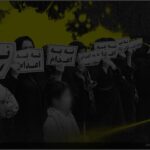


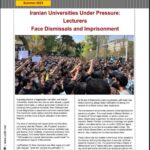





 Posted in
Posted in 
